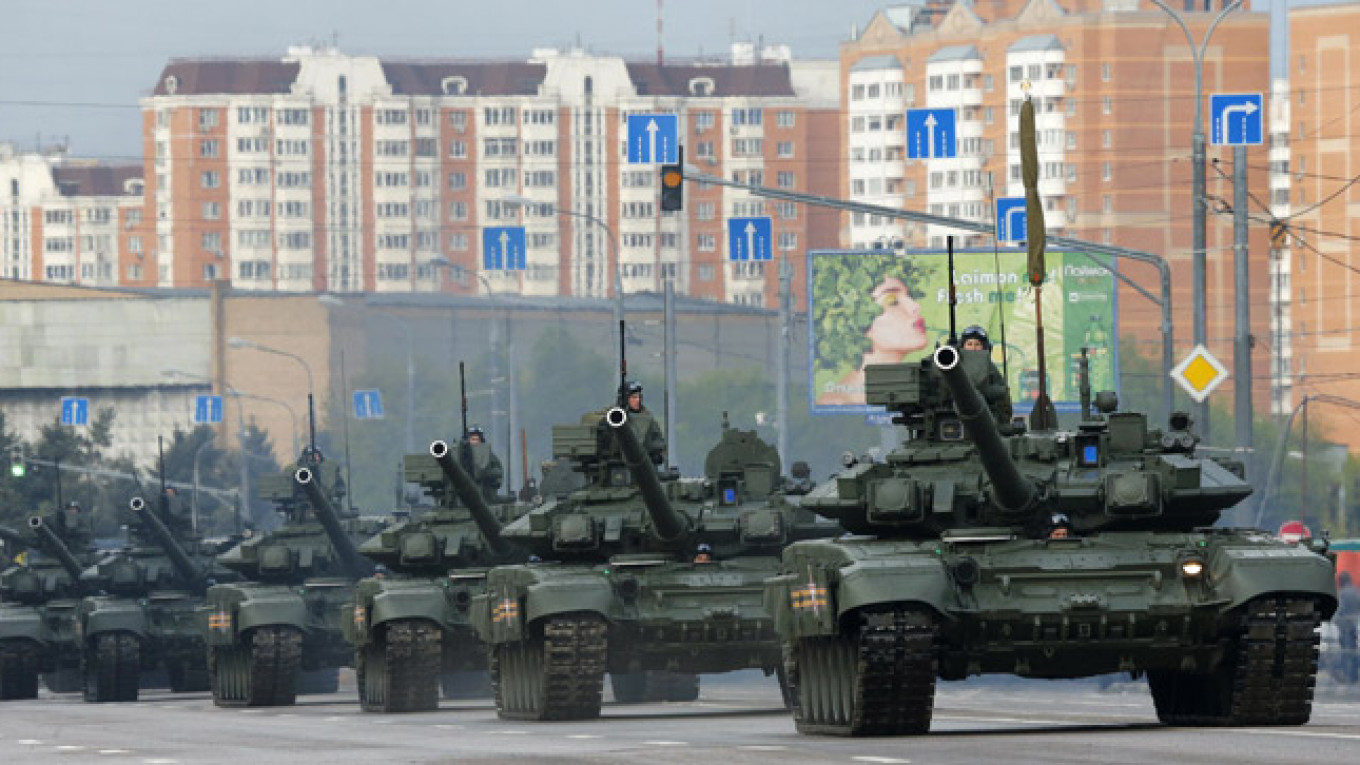Russian military actions in Crimea and throughout the crisis in Ukraine have led many to marvel at the "new model army" and improved, "rebooted" military force that the Kremlin now has at its disposal.
How deep the military's updated look penetrates to regular conventional forces, and not just special operations interior troops like the GRU special forces and the semi-elite VDV airborne troops, is much debated and yet to be seen beyond orchestrated military exercises. This in itself is a good thing; no one wants a second Georgia or an incursion into eastern Ukraine so that they may compare notes on Russia's armed forces.
The loss of Western defense contracts will have a lasting effect on modernization.
Even without a demonstration of force, though, it appears that the Ukrainian conflict could possibly stunt or derail continued modernization and reform, especially for the conventional forces many have claimed "improved."
As a direct result of the Kremlin's handling of Ukraine, Western defense contracts, technology and training infusions have been postponed or outright canceled. The Russian Defense Ministry, meanwhile, has become much more concerned with operating as an arm of the propaganda machine than with advancing reforms.
Russian ground forces had been set to receive a state-of-the-art training facility prior to events in Ukraine. The facility would have been up and running by the end of 2014 and was to be located in Mulino, just west of Nizhny Novgorod. This training center, to be built by Rheinmetall Defense of Germany, would have included a MOUT city, or Military Operations on Urban Terrain, interactive combat scenario areas and numerous live-firing ranges and maneuvering areas.
Each year 30,000 soldiers would have passed through this shiny new facility, training at the platoon to battalion levels, significantly improving the overall tactical capability and intra-operability of Russian forces over the course of just a few years.
The training center had the potential to make a difference up and down the chain of command, providing facilities to quickly teach basic to advanced skills and importantly, create an environment to operate with adjacent units under a higher command, all under realistic conditions.
But this deal, struck during the comparatively progressive days of Defense Minister Anatoly Serdyukov and General Nikolai Makarov, has been put on hold and will likely be canceled under future pressure from the U.S and its allies.
The defense industry is sure to dismiss claims that Western defense contracts were needed in the first place and that any and everything the Army needs can be found at home.
This is simply not true. Considerable time and resources would be wasted if domestic solutions were sought to meet the comprehensive needs of the modernization and reform program.
In the specific case of the Mulino training facility, time and quality have been lost; the ground forces were a mere year away from rotating units through this modern facility, a facility to be built by Germany to the specifications and standards of an integrated Western training complex.
Such a facility is vital for the quick and effective training of short-term soldiers, as the U.S. learned through 13 years of deployments to Iraq and Afghanistan, and would have gone a long way towards improving troop training cycles for contract and conscript soldiers alike.
But Russia's pressure on Ukraine has severed its Western defense ties, while France's contract to supply Mistral-class warships to Russia holds on at the stubborn insistence of the French government and shipbuilding industry. The loss of the Mulino facility and other such contracts will have a lasting effect on military modernization in Russia, stagnating an already difficult process.
Meanwhile, the Defense Ministry has become distracted by their information operations role in the Ukraine crisis. Not long ago, the military was steadily building bridges with Western counterparts, embarking on combined projects such as fighting narcotrafficking in Central Asia.
True, it was the West who backed out of these programs, stranding Russia with no partner. But the vitriol and rhetoric coming from the Defense Ministry adds fuel on the fire, and will only make rebuilding the bridges of military cooperation more difficult.
This hyperbole was on full display last weekend at the Moscow Conference on International Security where speakers accused the West of designing a new class of warfare in the form of "colored revolutions" and exporting this warfare around the world.
These speeches cost the Defense Ministry considerable institutional credibility, as they ignored other accepted drivers for color revolutions such as social, political, and economic pressures. Many at the conference were polite in their head nodding but remarked afterwards about the obvious purpose of this information — another Kremlin-directed information stream to play in domestic circles.
Russian military reform has been an unsung casualty of the Ukraine crisis. While the headlines have been largely positive about the new look of the Russian military, blowback from Ukraine may do serious harm to the continued progress of military reforms and modernization.
Colby Howard is a visiting fellow at the Centre for Analysis of Strategies and Technologies.
A Message from The Moscow Times:
Dear readers,
We are facing unprecedented challenges. Russia's Prosecutor General's Office has designated The Moscow Times as an "undesirable" organization, criminalizing our work and putting our staff at risk of prosecution. This follows our earlier unjust labeling as a "foreign agent."
These actions are direct attempts to silence independent journalism in Russia. The authorities claim our work "discredits the decisions of the Russian leadership." We see things differently: we strive to provide accurate, unbiased reporting on Russia.
We, the journalists of The Moscow Times, refuse to be silenced. But to continue our work, we need your help.
Your support, no matter how small, makes a world of difference. If you can, please support us monthly starting from just $2. It's quick to set up, and every contribution makes a significant impact.
By supporting The Moscow Times, you're defending open, independent journalism in the face of repression. Thank you for standing with us.
Remind me later.






